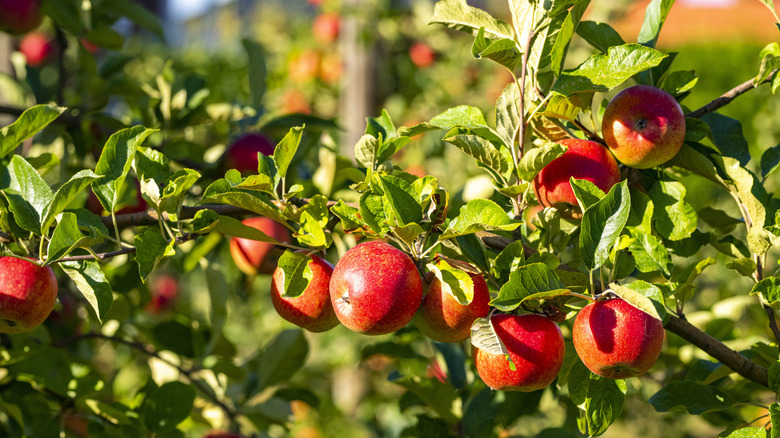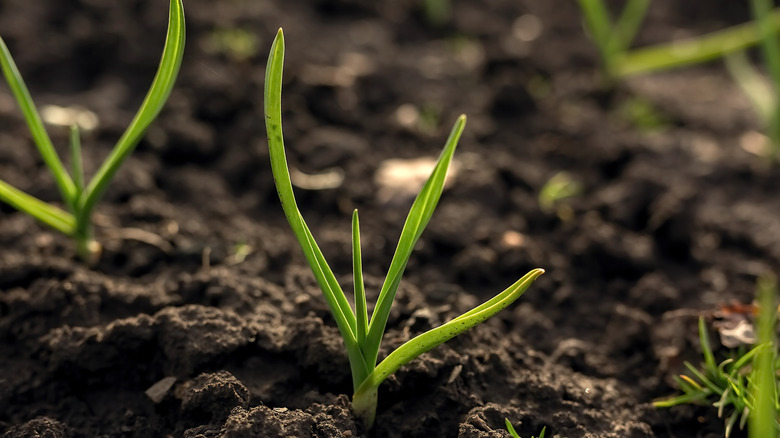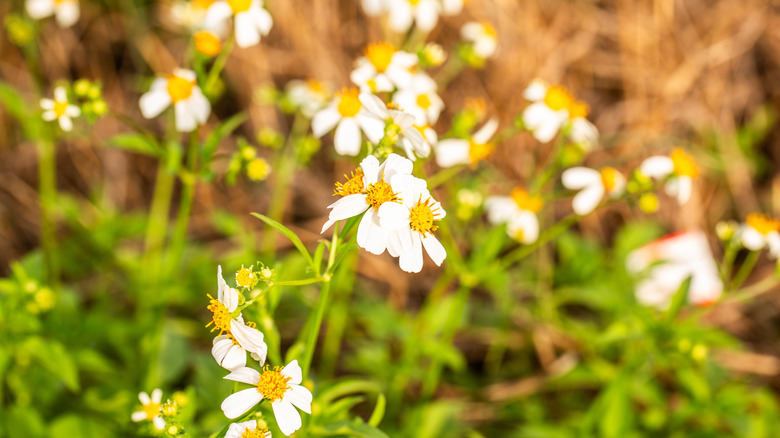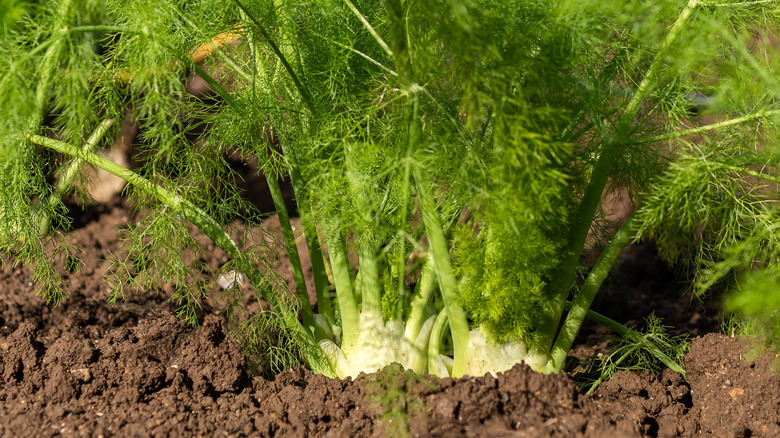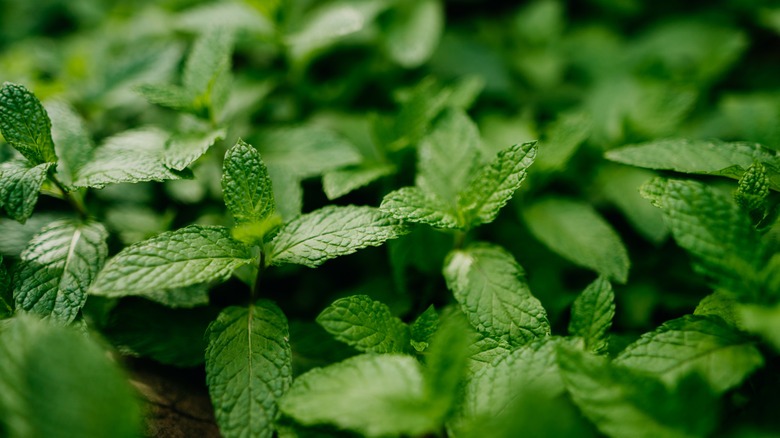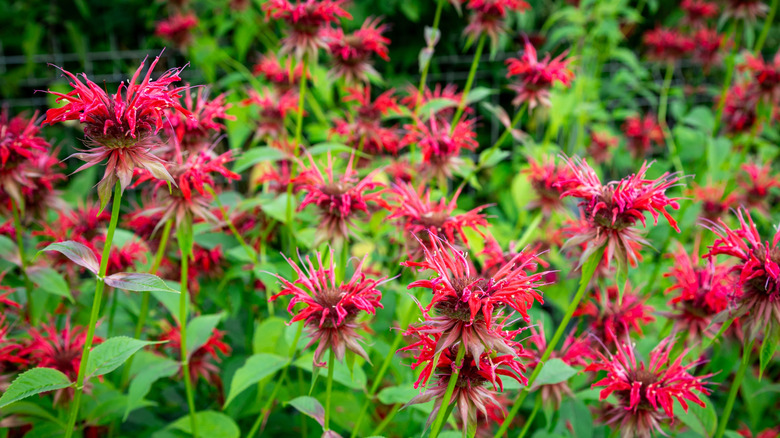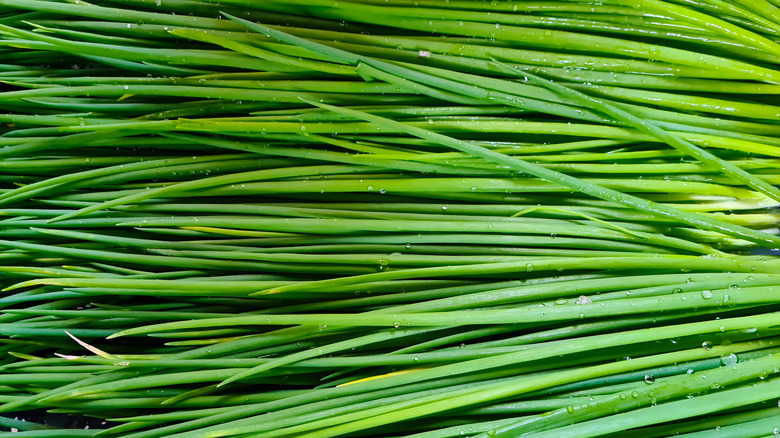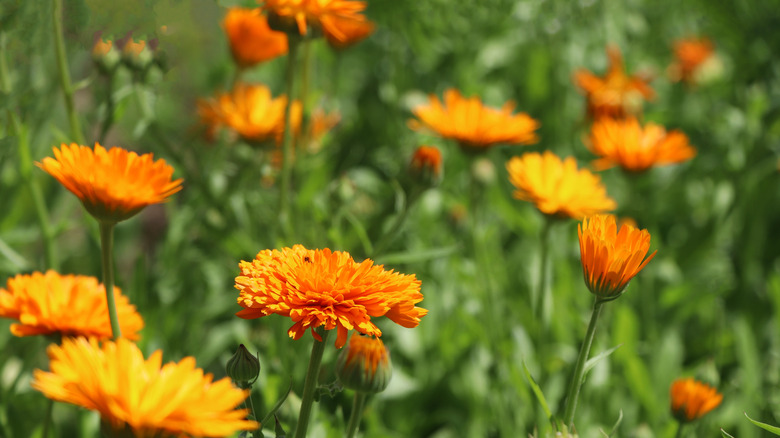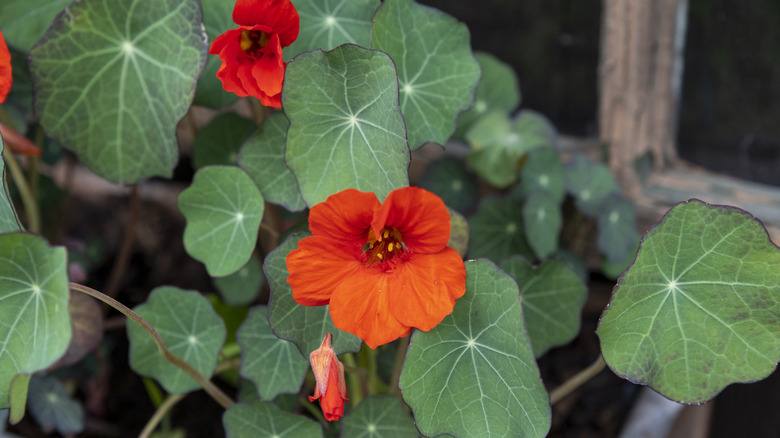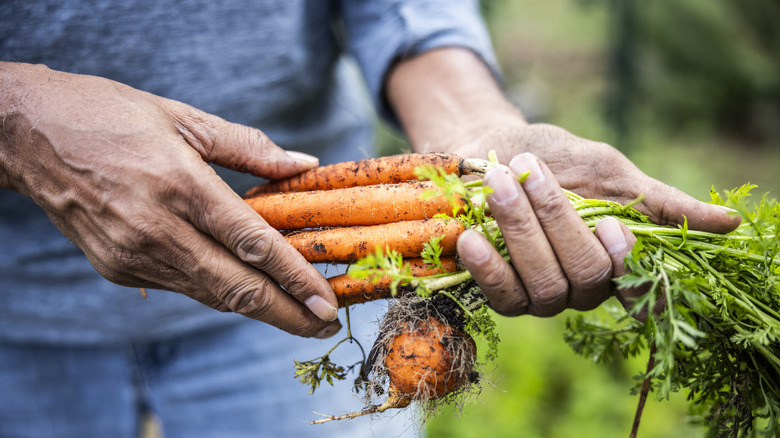9 Companion Plants To Put Near Apple Trees For A Pest-Free Harvest
If you're lucky enough to have an apple tree in your yard, you already know the joy that picking a fresh, juicy, and crisp fruit can provide. You also know the pain of having that joy spoiled when you discover that some pests got to it before you did. From aphids and caterpillars to deer, it can feel like the whole neighborhood wants a bite of your harvest. Fortunately, there are some great companion plants that you can grow to keep these annoying visitors at bay for a pest-free harvest. Plants like chamomile can attract beneficial bugs, whereas others, like garlic, also keep deer away. Some, like fennel, actually attract pests and distract them from going into your apple tree.
This strategy comes from what's called companion planting. It's a gardening philosophy and practice that encourages plants to work together and help each other. By surrounding your apple tree with the right plants, you can create an ecosystem that helps it thrive. It's a low-maintenance and chemical-free gardening technique that can go a long way in deterring pests. For apple trees, which are particularly susceptible to pests like maggots, moths, and their caterpillars, this can make or break your harvest. Apples are also commonly attacked by aphids (either the woolly apple kind or the rosy apple ones), which are tiny little insects that can make the fruits and leaves of the tree distorted and unusable.
Garlic
Garlic (Allium sativum) is a great companion plant for apple trees because it's been shown to repel aphids, one of the most common pests of apples. Not only that, but garlic is also a plant that deer hate because of its strong and distinct smell. As a result, planting garlic near an apple tree does two things: it helps prevent aphids, and it doesn't attract deer. It's a great choice to keep your apples looking and tasting pristine.
Chamomile
Chamomile (Matricaria chamomilla L.) can help protect your apples from aphids by attracting ladybugs. A clever way to reduce aphid populations is to attract the kinds of beneficial bugs that like to eat them. That's where chamomile, with its cute white flowers and yellow center, comes in. It's a fantastic companion plant for the apple tree because ladybugs absolutely love it. In return, the ladybugs will feast on aphids and help your apple tree.
Fennel
Fennel (Foeniculum vulgare) can help your apple tree fight against pests in a different way: attracting aphids. This technique of companion planting is known as "trap cropping," which is exactly what it sounds like: use another plant to attract (trap) pests and take some of the heat off of your apples. In addition, fennel attracts wasps to your yard, which prey on aphids and maggots. However, that's something to keep in mind if you have young kids roaming around the yard or if your apple tree is close to your home. It's always best to prevent wasps from building nests near your home.
Mint
Mint is known for its distinct smell. While you might love it, the same cannot be said about pests like aphids. The menthol scent of mint oil plants has been studied for its ability to confuse aphids. Therefore, planting some mint near an apple tree is a great idea, and it will come in handy for your summer salads and cocktails. You can also bring beneficial bugs to your garden with garden mint, helping your crops thrive. However, beware of some of the downsides of growing mint, like its ability to take over the garden. Use pots to keep it in check.
Bee Balm
Aphids are not the only problems that you have to worry about when it comes to your apples. One bigger pest loves these just as much as you do: deer. Consider planting some bee balm (Monarda), which is a beautiful, bright flower from the mint family. While they're not considered "repellent" but rather "resistant" to deer, they can be a useful natural barrier for an apple tree. Plant bee balm around it to create a natural fence that deer are less likely to cross on their way to your apples. Plus, deer-resistant plants can help keep ticks out of your backyard.
Chives
To keep deer out of your garden, consider planting some chives (Allium schoenoprasum) around. This delicious herb from the Allium family has a strong scent that deer hate. However, chive plants are typically short enough for deer to step over them on their way to a fresh apple. Therefore, it's good to pair chive plants with other, taller deer-resistant plants like the bee balm mentioned above. This can allow you to create a multi-layer natural barrier against hungry deer looking for a refreshing snack.
Calendula
Calendula (Calendula officinalis) is a type of annual flowering herb that pests absolutely love. And that's not as bad a thing as it sounds. Actually, because aphids love calendula, it makes them a great companion plant as a "trap" to distract and divert these little bugs away from your apple tree. If you're willing to sacrifice some of these flowers, you can help take some of the pressure off of apple trees. To use calendula as an apple companion plant, grow it near the tree but not right underneath, because the flowers will need full sun and won't enjoy living in the shade.
Nasturtium
Apple maggots are another type of pest that can wreak havoc on your harvest if they get to your fruits before you do. These are flies that lay larvae in the apple to grow in its flesh, resulting in a spoiled harvest. Nasturtium (Tropaeolum majus) flowers, which are cute and vibrant, are a fantastic trap crop to sacrifice to flies and their maggots. They can draw maggot flies (but also aphids) away from apples to make sure you can eat some fresh apples free of nasty bugs.
Carrots
Caterpillars, and especially those of the winter moth, are one of the culprits responsible for those holes you might see in apples and in apple tree leaves. These crawlers absolutely love fruit trees, and especially apple trees. One of the main prey of the winter moth is the wasp, which can lay their eggs into their larvae. To prevent caterpillars from destroying your apple harvest, plant some carrots (Daucus carota subsp. sativus) in your garden. These are guaranteed to bring about more parasitic wasps that can help reduce your winter moth population in your yard.
